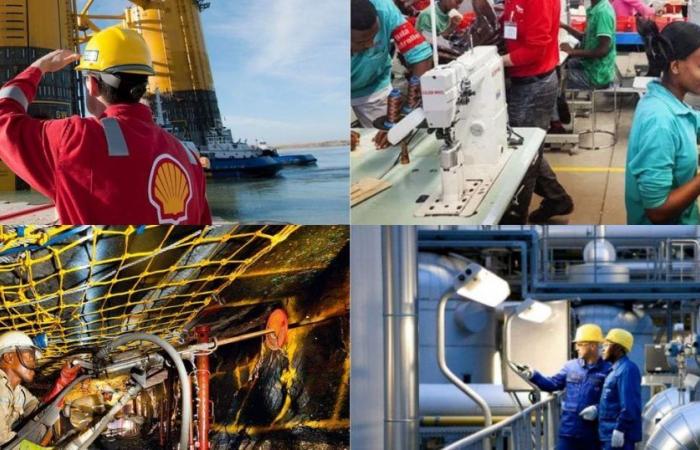From 2020 to 2023, the ranking order of African countries in terms of inward FDI flows has changed significantly. If the’Egypt and South Africa are firmly holding on to the top two, but in the last three years new challengers like Uganda and Senegal have entered the top five and are unlikely to be dethroned any time soon.
Read also: Automobile: Morocco and Turkey will concentrate 80% of Stellantis production within 3 years
In 2023, Africa saw a 3% decline in inward foreign direct investment (FDI), reaching $52.6 billion according to the latest UNCTAD statistics, compared to $54.4 billion in 2022 and $82.1 billion in 2021. Despite this slowdown, some countries stood out by capturing a significant share of FDI flows to the continent.
The top 5 African FDI destinations in 2023 are dominated by Egypt, leading with $9.841 billion captured, followed by South Africa ($5.233 billion), Ethiopia ($3.263 billion), Uganda ($2.886 billion) and Senegal ($2.641 billion). Let’s find out the key factors that have enabled these nations to attract foreign investors.
Egypt, a historical heavyweight
The main recipient of FDI in Africa for several years, Egypt capitalizes on its huge domestic market and massive investments from Gulf countries. But the country suffers from a structural trade deficit due to the weakness of its export apparatus and a significant share of incompressible imports.
Read also: How Egypt is consolidating its position as a gateway for FDI in Africa
This reliance on imports, combined with high financing needs, makes its economy vulnerable to external shocks. Added to this is the country’s inflation which remains high. Key sectors for attracting FDI are energy, real estate, financial services and tourism. Egypt’s vision for 2030 aims to further stimulate investment in promising areas such as renewable energy.
South Africa, an economic giant in decline
South Africa, the second largest African FDI destination, saw its inflows drop by half between 2021 and 2023. Despite a developed business environment, investors seem cooled by persistent socio-economic challenges such as inequality, unemployment and energy shortages. However, the mining, financial and manufacturing sectors remain attractive, as do emerging green projects.
Ethiopia, the rising force
In third position, Ethiopia confirms its status as an industrial hub of the Horn of Africa and its rank of 3rd in Africa, snatched in 2022 from Mozambique.
Read also: Car manufacturing in Africa: South Africa-Morocco match continues
Taking advantage of competitive production costs and a vast infrastructure project, the country attracts numerous foreign investments, particularly Chinese, in special economic zones, agri-food and textiles.
Uganda and Senegal, promises of diversification
Uganda and Senegal, respectively 4th and 5th FDI destinations in 2023, illustrate the emergence of new poles of attraction in Africa. Their ranking is the same as in 2022. This is a confirmation of the good form of these two countries, which dislodge Mozambique and Nigeria respectively 3rd and 4th in the 2020 ranking, then 3rd and 5th in the 2021 ranking. It should also be noted that Senegal is one of the rare countries in the African top 5 to have almost maintained the volume of incoming FDI intact between 2021 and 2023. Uganda is banking on its recent oil and gas discoveries while Senegal is positioning itself as a logistics and mining hub, in addition to capitalizing on its recent oil and gas discoveries.
Nigeria and Mozambique decline
Former top 5 countries in 2020 and 2021, Nigeria and Mozambique have seen their FDI flows erode in recent years due to security instabilities and policies unfavorable to foreign investors. Reforms will be necessary to regain their attractiveness.
Inward FDI flows of the African top 5 from 2020 to 2023 (million dollars).
| Pays | 2020 | Rang | 2021 | Rang | 2022 | Rang | 2023 | Rang |
|---|---|---|---|---|---|---|---|---|
| Egypt | 5.852 | 1er | 5.122 | 2nd | 11.400 | 1er | 9.841 | 1er |
| South Africa | 3.062 | 2nd | 40.215 | 1er | 9.231 | 2nd | 5.233 | 2nd |
| Ethiopia | 2.381 | 5th | 4.260 | 4th | 3.670 | 3rd | 3.263 | 3rd |
| Uganda | 1.191 | 10th | 1.648 | 9th | 2.963 | 4th | 2.886 | 4th |
| Senegal | 1.846 | 6th | 2.588 | 6th | 2.929 | 5th | 2.641 | 5th |
Agriculture, water and green energy are falling apart
Despite these contrasting performances, Africa is struggling to attract FDI in key sectors for sustainable development in accordance with the UN Goals. Funding for agriculture, water and green energy has declined significantly in 2023.
Read also: Automobile: Russian manufacturers are banking on establishments in Africa
To consolidate their rank, African FDI champions will have to pursue pro-investor reforms, the development of modern infrastructure, sector diversification and the energy transition. Facilitating business through dematerialized procedures and one-stop shops remains a priority issue.
The conquest of green investments, vectors of jobs and sustainable growth, will constitute one of the next challenges for these leading nations.






